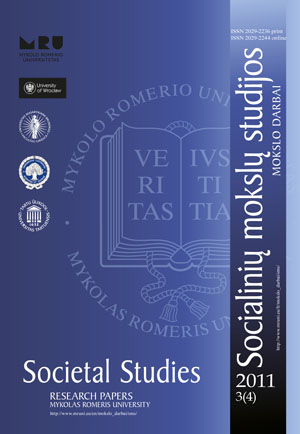Tarptautinio servituto institutas tarptautinėje teisėje: teoriniai aspektai
The Institute of International Servitude in International Law: Theoretical Aspects
Author(s): Inga GriškevičienėSubject(s): Social Sciences
Published by: Mykolas Romeris University
Keywords: International servitude; a dominant state; a servient state; right in rem; erga omnes obligations
Summary/Abstract: International servitude is a controversial category, but it is still used to solve disputes that arise among states. International servitude has been transferred from Private Law. The servitude first appeared in Civil Law, then it was moved to Public Law and, finally, to International Law. International servitude originated in feudal times. Experts in International Law give the definition of international servitude. It is possible to identify the features of international servitude: it has to be permanent, the subjects – two or more states, established by a particular international treaty or on another basis, one state is entitled to exercise rights within part or the whole of the territory of another state or one state is obliged towards another state not to exercise certain rights within part or the whole of its territory, it has to be established for a special purpose or interest relating to this territory. International servitude is usually established among states. On November 11th, 2002 The Joint Statement was signed between European Union and Russian Federation. It stated international servitude, i.e. the legal regime of the Special Kaliningrad transit for the citizens of Russian Federation travelling from Kaliningrad to Russian Federation and from Russian Federation to Kaliningrad crossing the territory of the Republic of Lithuania. In this international servitude three International Law subjects participate: European Union as the international organization, Russian Federation as a dominant state and the Republic of Lithuania, whose territory covers the interest of Russian Federation. The integral feature of international servitude is a state territory or its part. International servitude restricts the principal of territorial supremacy of the state, but it does not restricts the sovereignty of the state. To the contrary, the states establishing international servitude exercise their sovereign rights in International Law. Some obligations which arise from the establishment of international servitude are the so-called erga omnes obligations. Such obligations are established for the states which own the Suez and the Panama Canals. The other obligations which arise from other international servitudes are not recognized as erga omnes obligations in international law. International servitude is established by a particular international treaty or international customary law which states the content, validity and the expiration of the international servitude.
Journal: Socialinių mokslų studijos
- Issue Year: 3/2011
- Issue No: 4
- Page Range: 1461-1477
- Page Count: 17
- Language: Lithuanian

